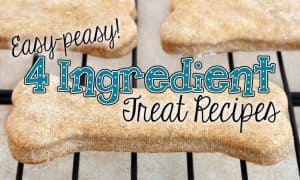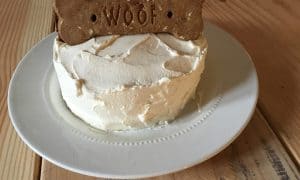“This post contains affiliate links, and I will be compensated if you make a purchase after clicking on my links.”

An abundance of pet food recalls and concerns of pet parents about food sourcing, production, and quality have led more and more dog owners to begin preparing homemade meals for their pets. However, a new study by researchers at the University of California Davis School of Veterinary Medicine revealed that homemade dog foods may not be providing pets with adequate nutrition.
Researchers prepared over 200 recipes found on the internet, in pet food cookbooks, and from veterinary textbooks, then analyzed the ingredients and the nutrients they provided. Only 9 (nine!) of those recipes met minimum standards established for adult dogs by the Association of American Feed Control Officials (AAFCO).
Keep in mind that the low quality, China-sourced, unhealthy dog foods that have compelled dog owners to begin cooking homemade in the first place DO meet these minimum requirements.
“Some owners prefer to prepare their dogs’ food at home because they want to feel they have better control over the animals’ diet, want to provide a more natural food or simply don’t trust pet food companies,” said Jennifer Larsen, assistant professor of clinical nutrition and lead author of the study. “The results of this study, however, indicate that most available recipes for healthy dogs, even those published in books by veterinarians, do not provide essential nutrients in the quantities required by the dog.”
The vast majority of homemade pet food recipes were nutritionally deficient to the point that it could be dangerous, even life-threatening, to your dog.
So, how will you know if your dog is getting the nutrients he needs?
Continue to page 2…



















Jilllian Franck
Jan 15, 2014 at 12:08 pm
Anyone with half a brain would doubt this article.
Justin
Aug 10, 2013 at 4:27 pm
Best PR campaign strategy ever!
Partner with a major university; create your own proprietary measuring tool, measure competitors to your standards instead of the well accepted Gold Standard, then publish in a major journal like JAVMA posing as science when the research is pseudoscience at best. Sorry JAVMA, but you’ve been fooled, and are being used as a tool for publicity. These are the same tactics and pseudoscience that has been used by the same industry for too long now. It needs to end.
One of the authors of this study is an owner of the Balance It balancing system. This is also the autobalancer used by the research team and UC Davis to make their diets. Does it seem strange to anyone else that the very researcher involved in the study, and for that matter the research team and very university, has a financial gain in finding 200+ other methods for making a homemade diet, including those of 120+ veterinarians as inferior to their own?
From the Balance It website: “DVM Consulting, Inc. was founded in 2003 by Sean Delaney, DVM, MS, DACVN, a board certified veterinary nutritionist who held an academic faculty position at UC Davis between 2003-2013, headed R&D for Natura Pet Products, Inc. until its acquisition by Procter & Gamble”
This “study” is essentially a Press Release from UC Davis attempting to stop people from making potentially more wholesome diets at home. Vets should be outraged that this group is trying to kill a trend toward more wholesome options instead of supporting them. It is essentially the same as a reputable human doctor fighting tooth and nail for some “Balanced Human Kibble” or processed “Human Meal Replacement Powder” against a balanced whole meal, simply because he’s part owner and his parent company is Proctor and Gamble. It wouldn’t make any sense there, and it makes no sense here.
There are many flaws with this study including: 1) potential conflict of interest 2) novel methodology that has not been used before 3) proprietary methods 4) small sample sizes used to make very large generalizations (only 15 diets were actually prepared and lab tested, but 200+ were claimed to have been concluded on – big leap in the evidenced based process).
Mike
Jul 27, 2013 at 12:21 am
Note that they only analyzed chemicals, not the dogs eating those diets. If the standards were set by dog food companies based on feeding studies using their baked pellets of mystery mush, I’m not surprised real food doesn’t meet those standards.
Rick Woodford
Jul 23, 2013 at 7:04 pm
It should be noted that “most recipes for healthy PEOPLE, even those published by doctors, do not provide essential nutrients in the quantities required by PEOPLE”. No one combination of foods can meet every protein, vitamin and mineral recommendation for dogs or people. Meeting our requirements and those of our dogs requires variety and supplementation.
Of course, recipes should be well thought out, but they need not be from a veterinary nutritionist. Do you ask a nutritionist or pediatrician every time you feed your child? I’ve analyzed hundreds of recipes from different books and websites and I agree with the findings of the study; most recipes do not meet every requirement for proteins, vitamins and minerals. However, I wonder if those recipes that did included supplements, because it is virtually impossible to meet every requirement with whole foods alone. If you look at commercial foods, the last half of the ingredient panel is all added vitamins and minerals, again pointing out that supplementation is a must.
Because commercial foods are so heavily supplemented with vitamins and minerals, from 200-600% or more of a dog’s requirements, I always recommend a half and half approach to achieve the best of bost worlds.
You can still Feed Your Best Friend Better at home, as long as you supplement.
Val
Jul 22, 2013 at 3:37 pm
I think people have forgotten the pet food horror from 2007
naturalnews.com/012647_pet_food_dog.html
I think making your pet food from organic and non gmo food is the key to good health! Remember dogs and cats are carnivores not vegans.
kris
Jul 18, 2013 at 10:44 pm
‘Only 9 (nine!) of those recipes met minimum standards established for adult dogs by the Association of American Feed Control Officials (AAFCO).’
why do i think this is double speak for the pet food industry that probably funded the study to begin with.. you don’t need a vet nutritionist to feed your dog. you need raw food and common sense. something the pet food industry is lacking.
Tina B
Jul 19, 2013 at 8:31 am
That’s EXACTLY what I was thinking!
Mattea
Jul 18, 2013 at 2:47 pm
it would have been helpful to know what recipes they felt were balanced. I make half the food my dogs eat each day. My vet says they are doing very well but it never hurts to keep researching. Is there any way to find out what recipes they approved of?
silvia smith
Jul 18, 2013 at 11:32 am
I started making my own dog food about 3 months ago. How do I find a Veternain Nutritionist? I am looking for an additive to make it a balanced meal for them. Thanks, Sil
Di
Jul 18, 2013 at 12:13 pm
I have found useful information by reading Dr. Pitcairn’s books.
April Leavitt
May 28, 2015 at 3:11 pm
I read the Whole Pet Diet by Andi Brown